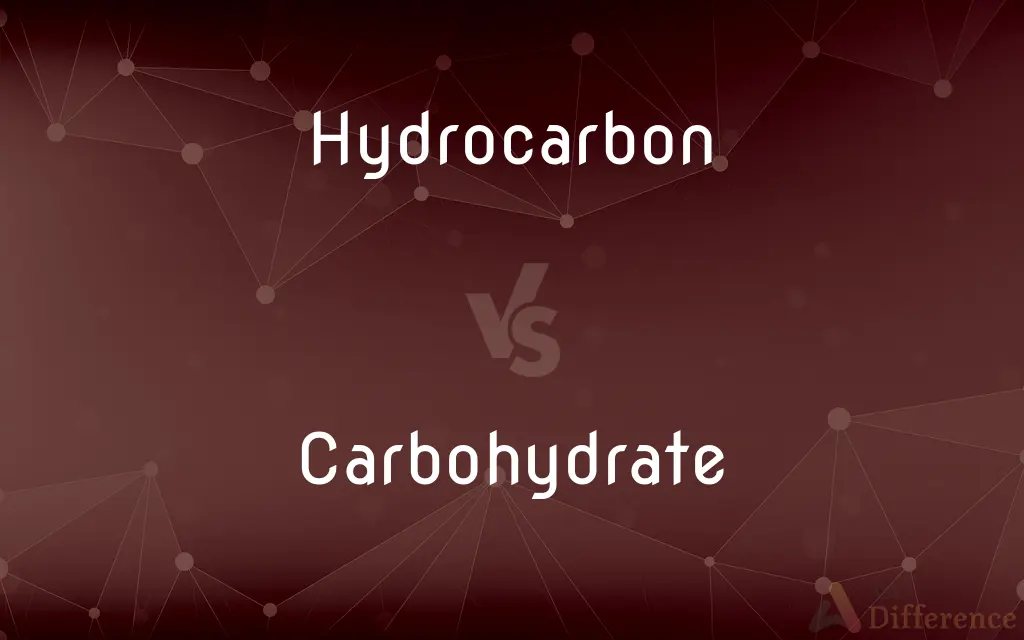Hydrocarbon vs. Carbohydrate — What's the Difference?
By Fiza Rafique & Urooj Arif — Updated on April 3, 2024
Hydrocarbons are organic compounds composed exclusively of hydrogen and carbon, fundamental to fuel & plastics. Carbohydrates are biological molecules consisting of carbon, hydrogen, and oxygen, crucial for energy & structural functions in living organs.

Difference Between Hydrocarbon and Carbohydrate
Table of Contents
ADVERTISEMENT
Key Differences
Hydrocarbons, simple organic compounds, consist solely of hydrogen and carbon atoms. They are primarily found in fossil fuels, such as oil and natural gas, and serve as the base for fuels like gasoline and diesel, as well as for manufacturing plastics and synthetic fibers. The structure of hydrocarbons, which can be straight-chained, branched, or ring-shaped (aromatic), determines their chemical properties and uses. In contrast, carbohydrates are organic molecules composed of carbon, hydrogen, and oxygen, typically in a ratio of 1:2:1. They play vital roles in living organisms, including providing energy through glucose, storing energy as starch in plants and glycogen in animals, and forming structural components like cellulose in plant cell walls.
While hydrocarbons are primarily used as fuel and in industrial applications due to their high energy content and versatility in chemical reactions, carbohydrates are essential for nutrition, energy storage, and structural functions within organisms. The metabolism of carbohydrates in living beings releases energy, which is used for various biological processes, including physical activity and cellular functions. Hydrocarbons, through combustion, release energy used in engines, heating, and electricity generation, contributing significantly to human-made CO2 emissions and impacting the global climate.
The environmental impact of these compounds also differs markedly. Hydrocarbons, when burned as fuel, release significant amounts of carbon dioxide, a greenhouse gas contributing to climate change. In contrast, the cycle of carbohydrate production and consumption in nature is part of the Earth's carbon cycle, with plants absorbing CO2 during photosynthesis and releasing oxygen, thus playing a crucial role in maintaining the atmospheric balance.
The study and manipulation of hydrocarbons are central to the petrochemical industry, focusing on extracting maximum energy and creating various synthetic materials. Meanwhile, research into carbohydrates spans biochemistry and nutrition science, focusing on understanding their roles in energy metabolism, disease prevention, and the development of dietary guidelines and medical therapies.
Hydrocarbons are nonpolar molecules, making them insoluble in water, which influences their environmental behavior and cleanup challenges, such as oil spills. Carbohydrates, often polar due to their hydroxyl (OH) groups, are generally soluble in water, which facilitates their biological functions, including transport in blood and cellular uptake.
ADVERTISEMENT
Comparison Chart
Composition
Carbon and hydrogen
Carbon, hydrogen, and oxygen
Role
Fuel, industrial applications
Energy source, structural functions in organisms
Environmental Impact
CO2 emissions, climate change contributor
Part of the carbon cycle, less direct pollution
Use in Industry
Petrochemical, energy
Food, biochemistry, renewable energy
Solubility
Generally insoluble in water
Generally soluble in water
Examples
Methane, ethylene
Glucose, starch
Structure
Straight-chain, branched, aromatic
Monosaccharides, disaccharides, polysaccharides
Compare with Definitions
Hydrocarbon
Sources of energy through combustion.
Gasoline, a hydrocarbon mixture, fuels internal combustion engines.
Carbohydrate
Soluble in water due to polar hydroxyl groups.
Sugar dissolves in water, illustrating carbohydrates' solubility.
Hydrocarbon
Varied structures including alkanes, alkenes, and aromatics.
Benzene, an aromatic hydrocarbon, is used in chemical synthesis.
Carbohydrate
Involved in the Earth's carbon cycle.
Plants convert CO2 into carbohydrates through photosynthesis.
Hydrocarbon
Organic compounds made of hydrogen and carbon.
Methane (CH4) is a potent greenhouse gas and hydrocarbon.
Carbohydrate
Sugars, starches, and fibers in foods.
Glucose is a simple sugar used by cells for energy.
Hydrocarbon
Nonpolar and water-insoluble.
Oil spills show hydrocarbons' insolubility in water.
Carbohydrate
Composed of carbon, hydrogen, and oxygen.
Cellulose, a carbohydrate, provides structural support in plant cell walls.
Hydrocarbon
The basis of fossil fuels and plastics.
Ethylene is used in the production of polyethylene, a common plastic.
Carbohydrate
Essential for energy and structural functions.
Glycogen, stored in the liver, is a carbohydrate energy reserve.
Hydrocarbon
In organic chemistry, a hydrocarbon is an organic compound consisting entirely of hydrogen and carbon. Hydrocarbons are examples of group 14 hydrides.
Carbohydrate
A carbohydrate () is a biomolecule consisting of carbon (C), hydrogen (H) and oxygen (O) atoms, usually with a hydrogen–oxygen atom ratio of 2:1 (as in water) and thus with the empirical formula Cm(H2O)n (where m may or may not be different from n). However, not all carbohydrates conform to this precise stoichiometric definition (e.g., uronic acids, deoxy-sugars such as fucose), nor are all chemicals that do conform to this definition automatically classified as carbohydrates (e.g.
Hydrocarbon
Any of numerous organic compounds, such as benzene and methane, that contain only carbon and hydrogen.
Carbohydrate
Any of a group of organic compounds, including sugars, starches, celluloses, and gums, that contain only carbon, hydrogen, and oxygen and that originate chiefly as products of photosynthesis. Carbohydrates serve as a major energy source for living things.
Hydrocarbon
(organic compound) A compound consisting only of carbon and hydrogen atoms. Category:en:Carbon
Carbohydrate
A food, such as bread, rice, or potatoes, that is composed largely of these substances.
Hydrocarbon
A compound containing only hydrogen and carbon, as methane, benzene, etc.; also, by extension, any of their derivatives.
Carbohydrate
A sugar, starch, or cellulose that is a food source of energy for an animal or plant.
These microbes are primarily responsible for breaking down cellulose and other carbohydrates into volatile fatty acids (VFAs).
Hydrocarbon
An organic compound containing only carbon and hydrogen
Carbohydrate
Any food rich in starch or other carbohydrates.
Carbohydrate
One of a group of compounds including the sugars, starches, and gums, which contain six (or some multiple of six) carbon atoms, united with a variable number of hydrogen and oxygen atoms, but with the two latter always in proportion as to form water; as dextrose, C6H12O6.
Carbohydrate
An essential structural component of living cells and source of energy for animals; includes simple sugars with small molecules as well as macromolecular substances; are classified according to the number of monosaccharide groups they contain
Common Curiosities
How do hydrocarbons impact the environment?
Hydrocarbons, when burned as fuel, release carbon dioxide, a greenhouse gas that contributes to global warming and climate change.
Are all hydrocarbons harmful to the environment?
While not inherently harmful, the extraction, processing, and combustion of hydrocarbons release pollutants and greenhouse gases, impacting air quality and contributing to climate change.
What is the significance of hydrocarbons in the economy?
Hydrocarbons are fundamental to the global economy, serving as the primary source of energy for transportation, heating, and electricity, and as raw materials for the chemical and manufacturing industries.
How is the structure of hydrocarbons related to their use?
The structure of hydrocarbons (straight-chain, branched, or aromatic) determines their physical properties and chemical reactivity, influencing their use as fuels, solvents, and in polymer production.
What roles do carbohydrates play in living organisms?
Carbohydrates are crucial for providing energy, storing energy, and forming structural components like cell walls in plants and connective tissues in animals.
What are the health implications of consuming carbohydrates?
While carbohydrates are essential for energy, excessive intake, especially of simple sugars, can lead to health issues like obesity, diabetes, and heart disease.
Can carbohydrates be used as a source of fuel?
Yes, carbohydrates can be converted into biofuels such as ethanol, which is used as an alternative to fossil fuels in engines.
How do hydrocarbons and carbohydrates differ in their solubility in water?
Hydrocarbons are generally insoluble in water due to their nonpolar nature, while carbohydrates are soluble because of their polar hydroxyl groups.
What are the environmental benefits of carbohydrates?
Carbohydrates play a key role in the carbon cycle, with plants absorbing carbon dioxide during photosynthesis and contributing to the reduction of greenhouse gases.
Can the consumption of hydrocarbons be reduced?
Yes, through the adoption of renewable energy sources, energy efficiency measures, and the development of alternative materials to replace petroleum-based products.
Share Your Discovery

Previous Comparison
Interregional vs. Intraregional
Next Comparison
Ceo vs. BossAuthor Spotlight
Written by
Fiza RafiqueFiza Rafique is a skilled content writer at AskDifference.com, where she meticulously refines and enhances written pieces. Drawing from her vast editorial expertise, Fiza ensures clarity, accuracy, and precision in every article. Passionate about language, she continually seeks to elevate the quality of content for readers worldwide.
Co-written by
Urooj ArifUrooj is a skilled content writer at Ask Difference, known for her exceptional ability to simplify complex topics into engaging and informative content. With a passion for research and a flair for clear, concise writing, she consistently delivers articles that resonate with our diverse audience.















































